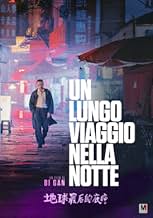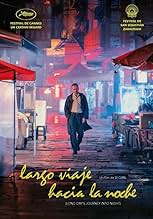NOTE IMDb
7,1/10
9,7 k
MA NOTE
Un homme retourne à Guizhou pour retrouver la trace d'une mystérieuse femme. Il se rappelle l'été qu'il a passé avec elle, il y a vingt ans.Un homme retourne à Guizhou pour retrouver la trace d'une mystérieuse femme. Il se rappelle l'été qu'il a passé avec elle, il y a vingt ans.Un homme retourne à Guizhou pour retrouver la trace d'une mystérieuse femme. Il se rappelle l'été qu'il a passé avec elle, il y a vingt ans.
- Réalisation
- Scénario
- Casting principal
- Récompenses
- 15 victoires et 45 nominations au total
Ming-Dow
- Traffic Police
- (as Ming Dow)
Histoire
Le saviez-vous
- AnecdotesThe marketing of the film was met with major controversy after its opening. The marketing of this art film was targeted massively towards the general public, instead of art film lovers. The film opened on December 31, 2018 since it was the last day of the year and it was intended to be "a good event to celebrate the new year". It was estimated that a lot of people went to see the film without knowing that this is an art house film. This resulted in major backlash as netizens complained against the film, as well as calling the ones who appreciated it "jia wenyi (phony-artistic)". The film earned 38 million USD on the first day of opening, yet the box office of the second day was decreased by 96%.
- ConnexionsReferenced in AniMat's Crazy Cartoon Cast: The End of that Stupid Hashtag (2020)
Commentaire à la une
"Long Day's Journey Into Night" is a dazzling and captivating look into the mind of one man's obsession with a woman who disappeared inexplicably from his life several years ago, and his odyssey to uncover her current location. As China's most financially successful arthouse release in history, foreign audiences will be equally captivated by this admittedly strange film's humanity, surrealism, and bizarre familiarity.
I first came to hear of this film after reading the extraordinary hype around its cinematography, which features a staggering 55-minute long cut that continues until the end of the film. Let me be abundantly clear that every ounce of this hype is deserved; perhaps even an understatement.
"Long Day's Journey" is quite possibly the most aesthetically beautiful film I've ever seen. If not, it is certainly in the top five. Nearly every single frame of this film looks like it could belong in an art museum. It is shot impeccably, without error, for its entire 133 minute runtime. The cinematographers -- of which there are three -- heavily rely on color contrast, distortion in the shape of oscillating water, gorgeous close-ups, and slow dollying. It attaches itself effortlessly to the film's dreamlike tone, like two perfect jigsaw pieces. It's a platitude, I know -- but it has to be seen to be believed. If there's any justice in the world, "Long Day's Journey" will be shown in college cinematography classes around the world for decades to come.
The film jumps back and forth from present day to roughly 20 years prior, when our protagonist Luo Hongwu (Huang Jue) was spending time with his since long-lost love, Wan Qiwen (Tang Wei). The cuts that change time periods are not always recognizable, and the overall delivery of the plot is muddled at times. I think that these subtle cuts were an intentional decision by the director, Bi Gan, to preserve a sense of dreamlike continuity that works in favor of the film's tone. Unfortunately, it messed with the overall comprehension of the plot -- at times it was unclear if the action on-screen was supposed to be occuring in present day, or in the past. About 30 minutes into the film, I noticed that Hongwu's facial hair was slightly different depending on the time frame; once I figured this out, the unclear timeline wasn't a huge issue for me. At the same time, I can completely understand why some would be utterly baffled by the film because of this. The two poor people who sat behind me never figured it out, frequently making comments about how confused they were, and I can't blame them.
But at the same time, "Long Day's Journey" isn't truly about the plot. It's about a man's mind, and the feelings of beauty, pain, darkness, and light that comes with the notion of loving someone you should've moved on from a decade ago. In a way, the cinematography and the fantastic score are the true "directors" of the film, and bring these themes to life even more than the plot itself.
The final 55 minutes of the film -- the long cut I mentioned earlier -- is a clear break from the rest of the film; an "epilogue" if you will. It is entirely surreal, perhaps even nonsensical, and heavily alludes to themes and symbolism from the first 90ish minutes...similar to a dream you might have about the day you just lived through. The ending of the film is ambiguous and open to interpretation, like all dreams are. To that end, if I had to describe the entire film in one word, it would certainly be "dreamlike."
This isn't a film for everybody, and that's okay. If you're turned off by nonlinear storytelling, "Long Day's Journey" won't do you any favors; it's not nearly as cohesive and accessible as other films that use the same format. However, I'd reckon that even if you had a difficult time understanding the plot, the overall tone and cinematography will guide you through the rest of the film. If you leave with nothing else, you'll have seen one of the most visually beautiful films of all time.
Take it to the bank, you'll see this film in the running for Best Foreign Film at the Oscars next year.
I first came to hear of this film after reading the extraordinary hype around its cinematography, which features a staggering 55-minute long cut that continues until the end of the film. Let me be abundantly clear that every ounce of this hype is deserved; perhaps even an understatement.
"Long Day's Journey" is quite possibly the most aesthetically beautiful film I've ever seen. If not, it is certainly in the top five. Nearly every single frame of this film looks like it could belong in an art museum. It is shot impeccably, without error, for its entire 133 minute runtime. The cinematographers -- of which there are three -- heavily rely on color contrast, distortion in the shape of oscillating water, gorgeous close-ups, and slow dollying. It attaches itself effortlessly to the film's dreamlike tone, like two perfect jigsaw pieces. It's a platitude, I know -- but it has to be seen to be believed. If there's any justice in the world, "Long Day's Journey" will be shown in college cinematography classes around the world for decades to come.
The film jumps back and forth from present day to roughly 20 years prior, when our protagonist Luo Hongwu (Huang Jue) was spending time with his since long-lost love, Wan Qiwen (Tang Wei). The cuts that change time periods are not always recognizable, and the overall delivery of the plot is muddled at times. I think that these subtle cuts were an intentional decision by the director, Bi Gan, to preserve a sense of dreamlike continuity that works in favor of the film's tone. Unfortunately, it messed with the overall comprehension of the plot -- at times it was unclear if the action on-screen was supposed to be occuring in present day, or in the past. About 30 minutes into the film, I noticed that Hongwu's facial hair was slightly different depending on the time frame; once I figured this out, the unclear timeline wasn't a huge issue for me. At the same time, I can completely understand why some would be utterly baffled by the film because of this. The two poor people who sat behind me never figured it out, frequently making comments about how confused they were, and I can't blame them.
But at the same time, "Long Day's Journey" isn't truly about the plot. It's about a man's mind, and the feelings of beauty, pain, darkness, and light that comes with the notion of loving someone you should've moved on from a decade ago. In a way, the cinematography and the fantastic score are the true "directors" of the film, and bring these themes to life even more than the plot itself.
The final 55 minutes of the film -- the long cut I mentioned earlier -- is a clear break from the rest of the film; an "epilogue" if you will. It is entirely surreal, perhaps even nonsensical, and heavily alludes to themes and symbolism from the first 90ish minutes...similar to a dream you might have about the day you just lived through. The ending of the film is ambiguous and open to interpretation, like all dreams are. To that end, if I had to describe the entire film in one word, it would certainly be "dreamlike."
This isn't a film for everybody, and that's okay. If you're turned off by nonlinear storytelling, "Long Day's Journey" won't do you any favors; it's not nearly as cohesive and accessible as other films that use the same format. However, I'd reckon that even if you had a difficult time understanding the plot, the overall tone and cinematography will guide you through the rest of the film. If you leave with nothing else, you'll have seen one of the most visually beautiful films of all time.
Take it to the bank, you'll see this film in the running for Best Foreign Film at the Oscars next year.
- kim_smoltz
- 2 juin 2019
- Permalien
Meilleurs choix
Connectez-vous pour évaluer et suivre la liste de favoris afin de recevoir des recommandations personnalisées
- How long is Long Day's Journey Into Night?Alimenté par Alexa
Détails
- Date de sortie
- Pays d’origine
- Sites officiels
- Langues
- Aussi connu sous le nom de
- Long Day's Journey Into Night
- Lieux de tournage
- Sociétés de production
- Voir plus de crédits d'entreprise sur IMDbPro
Box-office
- Budget
- 40 000 000 CNY (estimé)
- Montant brut aux États-Unis et au Canada
- 521 365 $US
- Week-end de sortie aux États-Unis et au Canada
- 26 746 $US
- 14 avr. 2019
- Montant brut mondial
- 42 140 994 $US
- Durée2 heures 18 minutes
- Couleur
- Rapport de forme
- 1.85 : 1
Contribuer à cette page
Suggérer une modification ou ajouter du contenu manquant

Lacune principale
What is the Hindi language plot outline for Un grand voyage vers la nuit (2018)?
Répondre
![Regarder Trailer [IT]](https://m.media-amazon.com/images/M/MV5BMDUzOGJjMTAtMGE1Zi00Y2JlLWEzMWItZTJiYjY2M2I4NDVlXkEyXkFqcGdeQXRyYW5zY29kZS13b3JrZmxvdw@@._V1_QL75_UX500_CR0)
















